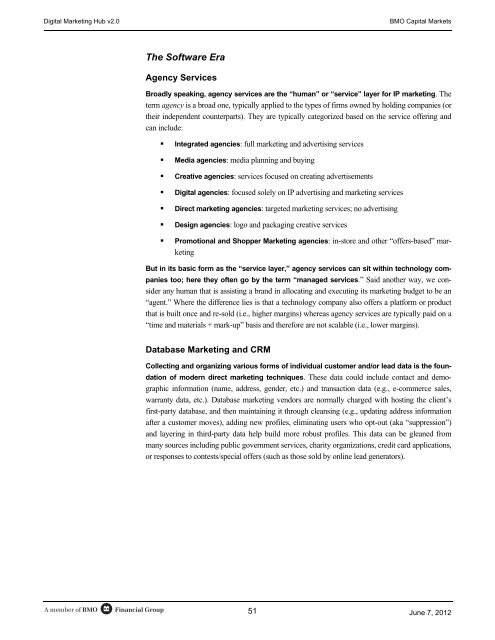DIGITAL MARKETING HUB v2.0 - AdExchanger
DIGITAL MARKETING HUB v2.0 - AdExchanger
DIGITAL MARKETING HUB v2.0 - AdExchanger
Create successful ePaper yourself
Turn your PDF publications into a flip-book with our unique Google optimized e-Paper software.
Digital Marketing Hub <strong>v2.0</strong><br />
BMO Capital Markets<br />
The Software Era<br />
Agency Services<br />
Broadly speaking, agency services are the “human” or “service” layer for IP marketing. The<br />
term agency is a broad one, typically applied to the types of firms owned by holding companies (or<br />
their independent counterparts). They are typically categorized based on the service offering and<br />
can include:<br />
• Integrated agencies: full marketing and advertising services<br />
• Media agencies: media planning and buying<br />
• Creative agencies: services focused on creating advertisements<br />
• Digital agencies: focused solely on IP advertising and marketing services<br />
• Direct marketing agencies: targeted marketing services; no advertising<br />
• Design agencies: logo and packaging creative services<br />
• Promotional and Shopper Marketing agencies: in-store and other “offers-based” marketing<br />
But in its basic form as the “service layer,” agency services can sit within technology companies<br />
too; here they often go by the term “managed services.” Said another way, we consider<br />
any human that is assisting a brand in allocating and executing its marketing budget to be an<br />
“agent.” Where the difference lies is that a technology company also offers a platform or product<br />
that is built once and re-sold (i.e., higher margins) whereas agency services are typically paid on a<br />
“time and materials + mark-up” basis and therefore are not scalable (i.e., lower margins).<br />
Database Marketing and CRM<br />
Collecting and organizing various forms of individual customer and/or lead data is the foundation<br />
of modern direct marketing techniques. These data could include contact and demographic<br />
information (name, address, gender, etc.) and transaction data (e.g., e-commerce sales,<br />
warranty data, etc.). Database marketing vendors are normally charged with hosting the client’s<br />
first-party database, and then maintaining it through cleansing (e.g., updating address information<br />
after a customer moves), adding new profiles, eliminating users who opt-out (aka “suppression”)<br />
and layering in third-party data help build more robust profiles. This data can be gleaned from<br />
many sources including public government services, charity organizations, credit card applications,<br />
or responses to contests/special offers (such as those sold by online lead generators).<br />
A member of BMO<br />
Financial Group<br />
51<br />
June 7, 2012


